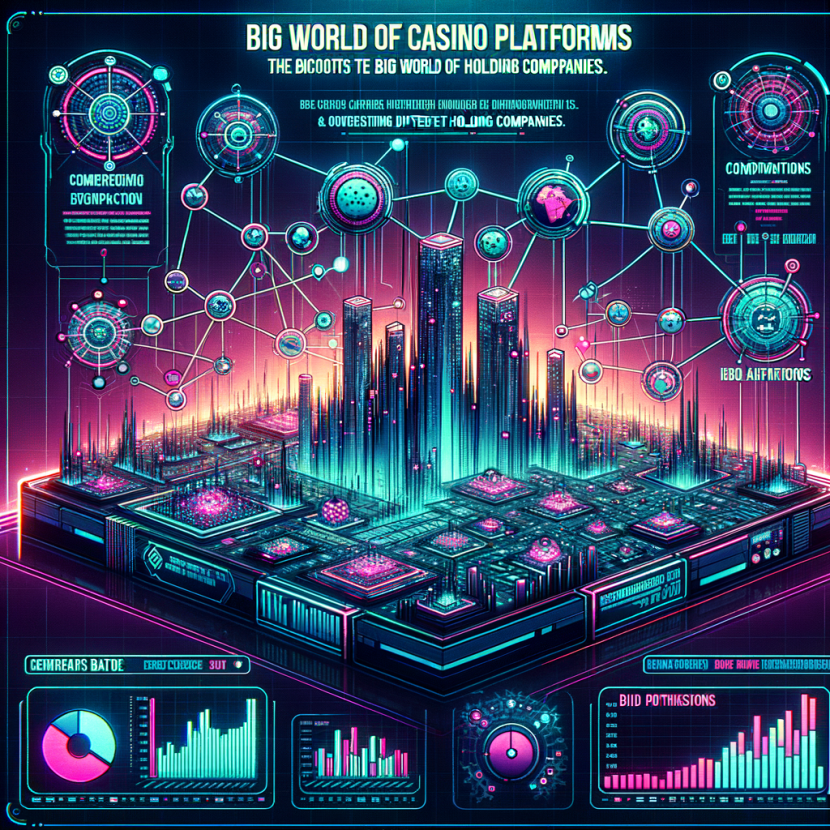Unveiling the Giants: Who’s Behind the Casino Curtains?
In the glitzy world of gambling, the casino platforms that illuminate Las Vegas, Atlantic City, and even the digital realm are often backed by enormous corporations. The question of who owns these establishments delves into a realm of powerful holding companies and strategic alliances that shape the gambling landscape. At the center of it all are a few behemoths that control some of the most iconic casinos across the globe, ensuring that the bells ring and the slots spin seamlessly.
The casino industry is not just about the flashy lights and the thrill of a winning hand; it involves intricate financial machinations and ownership structures that are often overshadowed by the entertainment they provide. Behind the curtain, these companies employ thousands and generate billions in revenue, making them pivotal players in the global economy. The major players include companies like Caesars Entertainment, MGM Resorts, and Las Vegas Sands, each holding significant stakes in a variety of casinos.
Understanding who owns which casinos can feel like deciphering a complicated puzzle, especially when you consider the myriad of mergers, acquisitions, and partnerships that have occurred over the years. The landscape is ever-changing, with companies continuously adapting to market demands, technological advancements, and shifts in consumer preferences. This dynamic environment ensures that the spotlight remains on the key figures steering these conglomerates.
While many people think of casinos as singular entities, they are often part of larger corporate structures that manage multiple properties. For instance, MGM Resorts International oversees several hotel and casino properties, including iconic names like The Bellagio and The Mirage. This extensive network allows them to offer a diverse range of experiences to customers, from luxurious accommodations to vibrant nightlife.
Furthermore, the rise of online casinos has introduced new players into the mix, as tech-savvy companies capitalize on the digital gaming revolution. The transition from brick-and-mortar establishments to online platforms has created even more opportunities for growth and investment, with many traditional casino giants entering the digital arena to capture new audiences.
As we delve deeper into the landscape of casino ownership, it becomes clear that understanding the players and their strategies is crucial for anyone looking to grasp the full picture of this high-stakes industry.
The Casino Kings: A Peek into Their Glittering Reigns
When it comes to the titans of the casino world, a few names stand out as royalty in this glittering domain. MGM Resorts International is one of the most recognizable casino brands, synonymous with the glitz of Las Vegas. With a portfolio that includes famous properties like the MGM Grand and the Bellagio, they dominate the market with a broad array of entertainment options and culinary delights.
Another heavyweight, Caesars Entertainment, boasts a rich history dating back to the early days of Las Vegas. Their expansive empire includes properties like Caesars Palace and Harrah’s, each a monument to luxury and excitement. With their recent merger with Eldorado Resorts, Caesars has solidified its position as a top player in the industry, continuing to evolve and innovate in response to market trends.
Las Vegas Sands, on the other hand, has carved a niche for itself in the Asia-Pacific region. Known for its lavish integrated resorts, such as The Venetian and Marina Bay Sands, the company has leveraged its strong foothold in Macau to become a leader in the international gaming market. Their focus on providing luxurious experiences sets them apart, attracting a clientele that seeks both gaming and high-end amenities.
In the context of online gaming, Flutter Entertainment has emerged as a formidable force. Acquiring brands like PokerStars and Betfair, Flutter has tapped into the growing trend of online gambling, expanding its reach beyond traditional casino walls. Their innovative approach to digital gaming has positioned them ahead of many competitors in the online landscape.
The Galaxy Entertainment Group is a key player in the Asian market, with notable properties in Macau. By focusing on premium offerings and entertainment experiences, they have successfully attracted affluent customers, solidifying their reputation as a luxury gaming destination.
As we celebrate these casino kings, it becomes evident that their reigns are defined not just by the riches they generate, but also by their ability to adapt, innovate, and capture the hearts of millions around the globe.
Holding Companies: The Powerhouses of Gaming Glory
At the core of the casino industry are holding companies that orchestrate the operations of multiple gaming establishments. These powerhouses provide the financial muscle and strategic direction necessary for success in such a competitive environment. Holding companies are crucial for pooling resources, sharing best practices, and managing risks across various properties.
Caesars Entertainment Corporation stands out as a model of effective consolidation in the gaming industry. With its vast portfolio encompassing multiple brands, Caesars has leveraged its scale to enhance operational efficiencies and drive growth. Their loyalty program, Total Rewards, is a prime example of how holding companies can create value by encouraging customer retention across their various properties.
Similarly, MGM Resorts International operates under a holding company structure that allows it to manage a diverse range of hotel and entertainment properties. This model enables MGM to provide a wide array of options for guests while maximizing revenue through shared marketing and operational strategies.
Wynn Resorts, known for its luxurious offerings, exemplifies how holding companies can bring a distinct brand identity to the casino landscape. With properties like Wynn Las Vegas and Encore, the company emphasizes high-stakes gambling and opulent experiences, attracting a clientele that values exclusivity.
In the online sector, companies like DraftKings and FanDuel have emerged as holding companies that encompass multiple gaming brands and offerings. Their ability to aggregate various aspects of the gaming experience—from sports betting to online casinos—illustrates the shifting dynamics of the industry.
The role of holding companies extends beyond mere financial management; they are also critical in shaping the future of the gaming landscape. Their decision-making influences everything from marketing strategies to technological investments, making them key players in the success of the casino industry.
As the landscape continues to evolve, the importance of holding companies will only grow, as they adapt to changing regulations, market demands, and consumer preferences in this dynamic sector.
Networks that Sparkle: Ties That Bind Casino Empires
The casino industry is not just a collection of individual properties; it is a web of interconnected networks that create synergies and maximize profitability. These networks allow companies to share resources, knowledge, and strategic initiatives, enhancing their competitive edge in a crowded marketplace.
One of the most notable networks is the Global Gaming Expo (G2E), an annual gathering that connects industry professionals from around the world. It serves as a platform for networking, showcasing innovations, and discussing trends that shape the future of gaming. Events like G2E highlight the importance of collaboration among casino operators, suppliers, and regulators, fostering an environment of growth and innovation.
Loyalty programs represent another critical network within the casino ecosystem. Companies like Caesars Entertainment and MGM Resorts leverage these programs to build customer relationships and drive repeat business. By connecting various properties within a single network, these programs incentivize customers to explore different venues while enjoying rewards across the board.
Moreover, partnerships with technology firms have become increasingly vital in the casino industry. Collaborations with companies specializing in gaming technology, data analytics, and customer experience have transformed the way casinos operate. By integrating cutting-edge technology, casinos can enhance their offerings, streamline operations, and provide personalized experiences for guests.
The emergence of digital payment solutions has also added a new dimension to casino networks. Companies are now collaborating with fintech firms to offer seamless, secure transactions for customers. This innovation not only improves the gaming experience but also enhances security and efficiency in financial operations.
As the casino landscape continues to evolve, the power of networks will play a crucial role in shaping the future of the industry. Companies that foster collaboration and leverage shared resources will be better positioned to thrive in an increasingly competitive environment.
Big Bets: Exploring Billion-Dollar Casino Ventures
The allure of the casino industry lies not only in the excitement of the games but also in the immense financial stakes involved. Many casino ventures have crossed the billion-dollar threshold, showcasing the lucrative potential of this dynamic market. These investments often come with high risks but promise high rewards for those who dare to dream big.
One of the most significant examples of this is the development of integrated resorts in Asia, particularly in Macau. Companies like Las Vegas Sands and MGM Resorts have invested billions in creating opulent destinations that combine gaming, entertainment, dining, and luxury accommodations. These resorts cater to affluent travelers and have transformed Macau into the gambling capital of the world.
In Las Vegas, the construction of CityCenter, a massive mixed-use development project, reflects the scale of investment in the casino sector. With a price tag exceeding $8 billion, CityCenter includes several hotels and residences, offering a glimpse into the future of urban entertainment. Such ventures highlight the commitment of casino operators to create expansive, immersive experiences for their guests.
The rise of online casinos has also led to significant investments in technology and platform development. Companies like Flutter Entertainment and DraftKings have made substantial bets on the future of digital gaming, acquiring multiple brands and expanding into new markets. Their strategies emphasize the importance of innovation and adaptability in an ever-changing landscape.
The global pandemic highlighted the resilience of the casino industry as companies pivoted to embrace online gaming and sports betting. The surge in demand for digital gambling has prompted investments in technology and customer engagement strategies, leading to new revenue streams and growth opportunities for many operators.
As we look to the future, it’s clear that big bets will continue to shape the casino landscape. The successful ventures will be those that can balance risk with innovation, creating experiences that captivate audiences and keep them coming back for more.
The Future of Fun: Who Will Hold the Casino Crown?
As we survey the casino landscape, it becomes evident that the future is bright for the industry. With emerging technologies, evolving consumer preferences, and a heightened focus on sustainability, the casino world is poised for transformation. Companies that embrace change and prioritize customer experiences will be the ones that reign supreme in this competitive arena.
The integration of technology into gaming experiences is set to revolutionize how casinos operate. From virtual reality gaming to advanced data analytics, operators are leveraging innovations to create personalized and engaging environments for guests. As the lines between physical and digital gaming continue to blur, the potential for growth is immense.
Furthermore, the rise of esports and online gaming has opened new avenues for revenue generation. Traditional casino operators are now exploring partnerships with esports organizations and investing in online platforms to capture this burgeoning market. This diversification is crucial for remaining relevant in an industry that is rapidly evolving.
Sustainability is another key factor shaping the future of the casino industry. Companies are increasingly prioritizing green initiatives, from energy-efficient designs to eco-friendly practices. By adopting sustainable policies, operators not only contribute to environmental preservation but also attract a growing segment of socially conscious consumers.
As we look ahead, the competition among casino giants will intensify, with new players entering the market and existing operators expanding their footprints. The ability to adapt to changing consumer preferences, embrace technological advancements, and foster collaboration within networks will ultimately determine who holds the casino crown in the years to come.
As the future unfolds, the excitement of the casino industry will undoubtedly continue to captivate audiences around the world, ensuring that the thrill of the game remains alive and well.
| Casino Company | Notable Properties | Market Cap (Approx.) | Focus Area |
|---|---|---|---|
| MGM Resorts International | Bellagio, MGM Grand, The Mirage | $15 Billion | Integrated Resorts |
| Caesars Entertainment | Caesars Palace, Harrah’s, Horseshoe | $12 Billion | Hospitality and Gaming |
| Las Vegas Sands | The Venetian, Marina Bay Sands | $20 Billion | Luxury Integrated Resorts |
| Flutter Entertainment | PokerStars, Betfair, FanDuel | $30 Billion | Online Gaming |
| Wynn Resorts | Wynn Las Vegas, Encore | $10 Billion | Luxury Gaming |
Q&A Section
Q1: Who are the largest casino companies in the world?
A1: Some of the largest casino companies include MGM Resorts International, Caesars Entertainment, Las Vegas Sands, and Flutter Entertainment.
Q2: How do holding companies impact the casino industry?
A2: Holding companies manage multiple casino properties, enhancing operational efficiency, sharing resources, and driving growth through strategic initiatives.
Q3: What role do loyalty programs play in casinos?
A3: Loyalty programs help casinos retain customers by offering rewards and incentives that encourage repeat business across different properties within a network.
Q4: How has online gaming changed the casino landscape?
A4: Online gaming has expanded the market, leading traditional casino operators to invest in digital platforms and adapt their offerings to meet changing consumer preferences.
Q5: What are some future trends in the casino industry?
A5: Key trends include the integration of technology into gaming experiences, a focus on sustainability, and the rise of esports and online gambling, which will shape the future of the industry.




